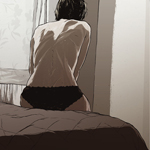|
|
 |
Dusted Reviews
Artist: On Album: Something That Has Form and Something That Does Not Label: Type Review date: Nov. 5, 2010 |

|
|
|
 |
Chicagoan Steven Hess has an affinity for +1 situations, and I’m not talking about guest lists. Until recently, his trio Haptic added a fourth member each time it performed, and On, his duo with Sylvain Chauveau, includes a different third person each time it records. Presumably he and his partners hope that they’ll keep things creative by disrupting established working patterns.
In On’s case, it seems to have kept them from making the same record twice. The third party’s duty is not to play with the duo, but to process and re-mix their recordings however they see fit. Helge Sten (a.k.a. Deathprod) turned On’s debut, Your Naked Ghost Comes Back At Night, into an exploration of depth, both in terms of the attention he paid to the low end, especially Hess’s kick drum, and the way he made everything sound impossibly far away. The way Pierre-Yves Macé isolated the prettiest elements on Second Soufflé — Hess’s glockenspiel, Chauveau’s piano — was a wistful springtime tonic to the first one’s dusky nordic gloom.
This time out, Christian Fennesz uses On’s material to reconnect with elements of his own work without re-making his own records. The opening track, “The Inconsolable Polymath,” is a surgically precise onslaught of lancing high frequencies, the likes of which Fennesz abandoned after Plus Forty Seven Degrees 56’37" Minus Sixteen Degrees, but it has little of that record’s digitally enabled chaos. Instead, tones of uncertain origin ring out, pulsing like they came from struck bells even while sounding synthetic. The next tune, “Blank Space,” is composed of elongated cymbal sounds and clicking electronics layered so that the catchiest element is buried deep, a device that Fennesz still uses in concert but which rarely shows up on his records anymore.
Fennesz shows his reconstructive hand on “A Tardy Admission That The Crisis Is Serious.” While the component sounds — tapped cymbals, a bass figure, subliminal keyboard chimes — sound unmolested, I doubt that they were originally played next to each other. Each part is looped. It’s as though he imported a few phrases into his computer, set each to repeat, and then adjusted the levels as they all played. The sprawling closer, “The Sound Of White,” takes this approach to an extreme. Each of its essential parts — an organ melody, a swell of feedback, some amp hum and crackle — loops unmolested for nearly 20 minutes. This makes the barest alterations — like a shift in relative volume, the ring of a chime, or the brief appearance of some incidental rustling — seem inordinately dramatic, like the plop of a fish leaping just once above the surface of an otherwise placid expanse of water.
By Bill Meyer
|







